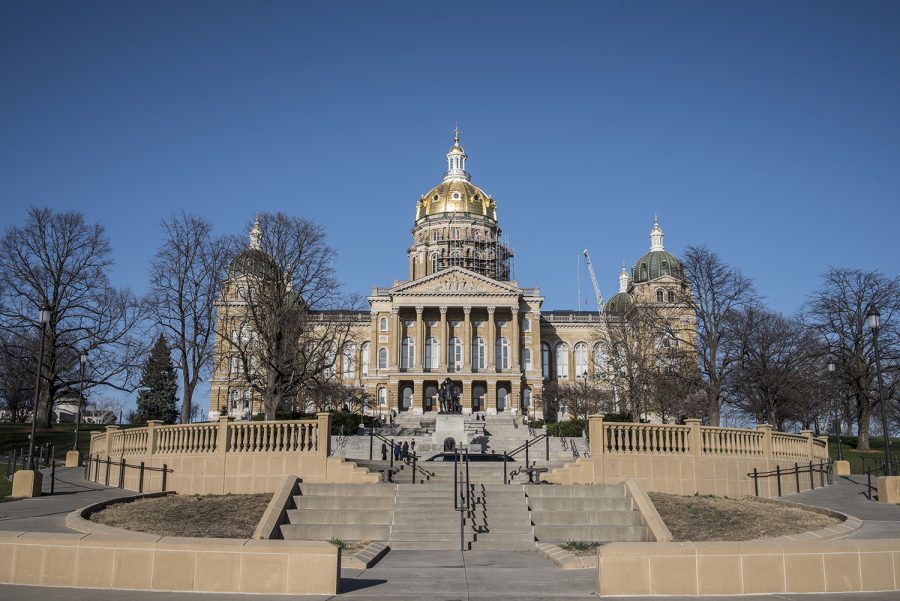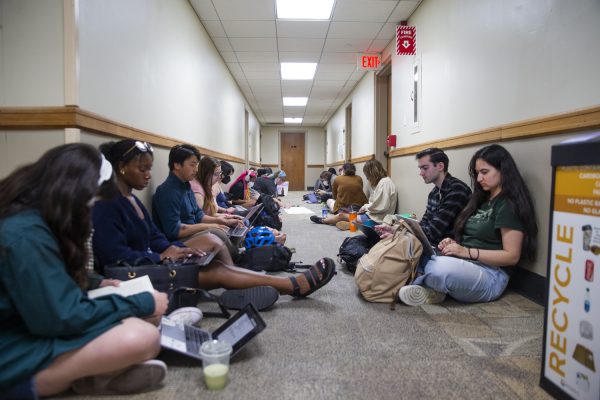Bill to freeze funding for regents universities passed through state House Appropriations Committee
The bill increases funding for other education entities, but not for the University of Iowa, Iowa State, or the University of Northern Iowa.
The Capitol building in Des Moines is pictured on April 29, 2018.
April 12, 2021
A bill that proposes zero increased funding and a tuition freeze for Iowa’s three regents universities was approved by the state House Appropriations Committee on a party-line vote on Monday.
House File 868 includes increased funding compared to fiscal 2021 for programs and grants in the Department of Education and the state Board of Regents’ Iowa School for the Deaf and the Iowa Braille and Sight Saving School, but not for the University of Iowa, Iowa State, or the University of Northern Iowa.
A Board of Regents spokesperson did not respond to The Daily Iowan’s request to comment by the time of publishing.
Rep. David Kerr, R-Morning Sun, said the rationale behind not increasing the funding was that regents universities already received federal COVID-19 relief money from the American Rescue Plan.
During the meeting Kerr said ISU was estimated to be receiving $57 million, UI was receiving about $45 million, and the UNI was receiving $21 million from the American Rescue Plan. He also said the colleges have seen a decrease in enrollment that contributed to the choice to not increase funding.
Enrollment across all three regents universities decreased 4.4 percent between Fall 2019 and 2020, with the UI seeing a decrease of 2.5 percent, ISU seeing a decrease of 4.7 percent, and UNI seeing a decrease of 9.3 percent.
Those numbers continue a four-year trend that is reflected nationwide. A significant share is a drop in international student enrollment for Iowa universities. Higher education institutions are facing what they expect to be a national decline in college-age students across the U.S. in the coming years, exacerbating financial woes from the pandemic.
“The federal government money is there and when you put that with the fact that a lot of the regents didn’t hold in-person classes — because I’ve certainly heard from some parents who thought that maybe they should get a refund, compared to what they got versus what they thought they were paying for — it would seem to me that there could be some cost savings there for the regent universities,” said Rep. Steven Holt, R-Denison.
For the last three semesters, 70 percent of classes or more at the UI have been conducted online. In the fall, the UI is looking to return to almost entirely in-person operations.
Democrats raised objections to Holt’s reasoning, saying that all entities have seen a decrease in enrollment, and that community colleges have seen a greater decrease than regents universities. They also said the COVID-19 relief money can only be spent on certain items, and that other entities were able to receive both COVID assistance and an increase in state funds.
The bill would also prevent the regents from raising tuition rates and fees until June 2022.
“We have our state funding that is frozen. And in this bill you also freeze tuition and fees,” said Rep. Cindy Winckler, D-Davenport. “That is, we have frozen 100 percent of their budget … and their ability to fund the ongoing costs, inflation, as well as just the fixed costs that go up every year. And I truly believe that it is so difficult for our students and our institutions to be able to manage under these circumstances.”
As previously reported by the DI, Iowa lawmakers cut $8 million from the regents’ budget in June 2020 after the regents requested an $18 million increase for fiscal year 2021.
This year, the regents again requested an $18 million increase in state appropriations and a restoration of the $8 million cut. Gov. Kim Reynolds recommended a $15 million increase, and the state Senate has indicated they would provide at least a $8 million increase to replenish last year’s cuts.
Rep. Chris Hall, D-Sioux City, ranking member of the House Appropriations Committee, said when he was looking at the bill in the context of comments from Republicans outside of the House Appropriations Committee, the proposal to not increase funds for regents universities misses the mark.
“The governor recommended [$15 million]. The Senate is committed to doing at least eight. And here the House is proposing zero,” Hall said. “So, even among your counterparts who are managing state government right now, this is a budget that does not invest in higher education in a fair and equitable form across the spectrum.”
Democrats said the budget proposal sent a negative message about the state’s priorities and would lead faculty away from the state. The appropriations meeting was held on the same day as the public forum for the first UI presidential candidate.
“If I was looking to become the president, I would want to see positive things happening in our universities and not seeing our Legislature … not giving new funding to these universities,” said Rep. John Forbes, D-Urbandale.















